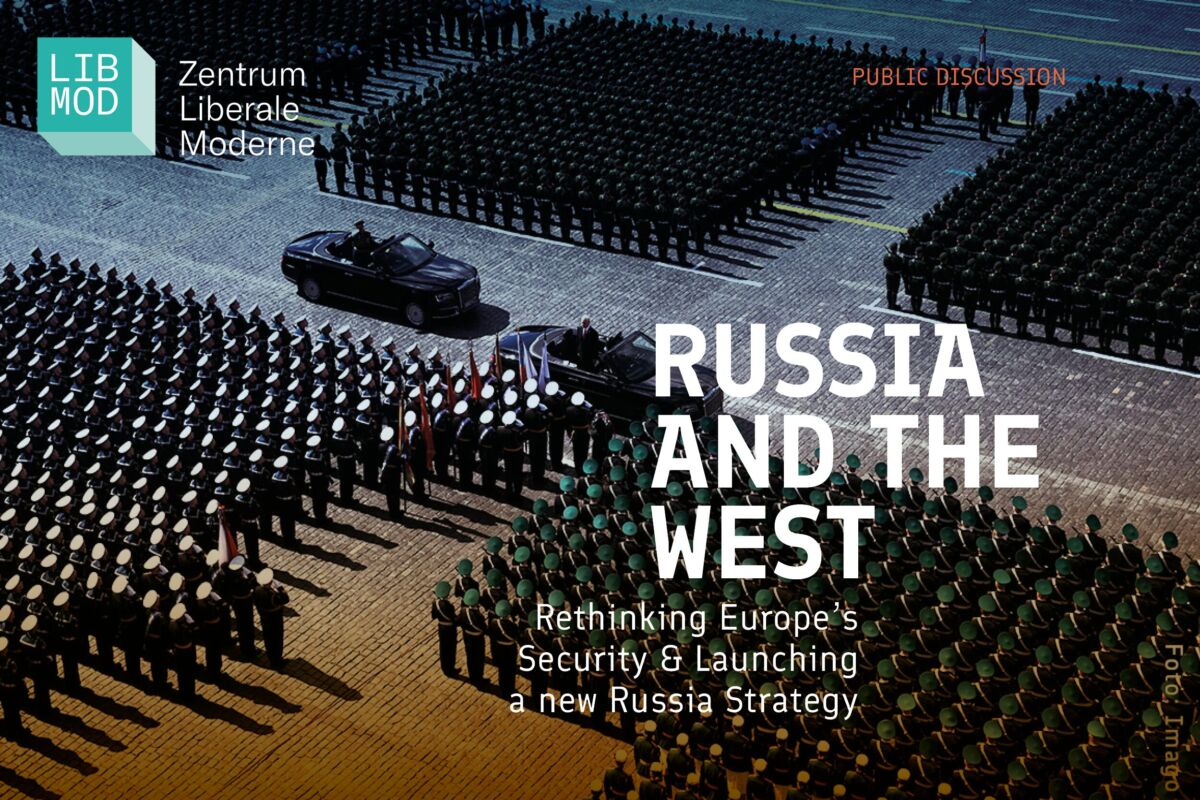Turning point: Why we need to overcome our peace mentality
Russia’s war of aggression against Ukraine is a turning point for Europe and the whole world. What are its policy implications? Are the sanctions imposed so far sufficient to contain the Kremlin? We discussed this with prominent politicians and diplomats at a joint event organized by the Center for Liberal Modernity (LibMod) and the Munich Security Conference.
In his introduction, LibMod founder Ralf Fücks called for urgent action “in the face of a war that increasingly resembles a war of annihilation”. Europe is not passive, “but there is that lasting impression of too little too late”. Fücks recalled Nord Stream 2 and the German discussions about arms deliveries to Ukraine and Russia’s expulsion from SWIFT. “Have we arrived mentally and politically in a new era? Are we doing everything to make Putin lose this war, or are we still hoping for an arrangement with the Kremlin?” he asked.
Ukraine as “Mr. Putin’s backyard”
Michael Roth, a Social Democrat MP and chairman of the Bundestag’s Foreign Affairs Committee, conceded that the much-touted “turning point” in German foreign and defence policy has not yet reached everybody. “Yes, we are not doing enough for Ukraine,” he said. To many Germans, Eastern Europe was of secondary importance and they saw it as “Mr. Putin’s backyard. “But that is changing now,” he said.

Roth admitted that he only decided to support arms shipments to Ukraine after Putin’s “awful speech” on Monday before the war: “The violation of international law implies a duty to assist, and Ukraine only has a chance of survival from a position of strength,” he said.
Marie-Agnes Strack-Zimmermann, an MP for the Free Democrats who chairs the Bundestag Defence Committee, argued that the enormous amount of refugees was also part of the war: “This is an attempt to destabilize neighboring countries with human trafficking,” she said.
Defending Germany also on the Dniester and Dnipro rivers
Roderich Kiesewetter, a Christian Democrat MP who chairs the Bundestag’s Intelligence Committee, demanded an embargo against Russian energy exports and to step up military aid to Ukraine. “We can’t say that Germany’s security is being defended at the Hindukush, but not at the (rivers) Dniester and Dnipro,” he said. Former German Defense Minister Peter Struck had used the Hindukush reference to defend the deployment of German soldiers to Afghanistan. Kiesewetter also demanded to offer Ukraine a possibility to join the EU after the war.

Green Party MP Agnieszka Brugger stressed that Germany must speed up its energy transition in order to help Ukraine. Brugger said that President Zelenskiy’s video address to the Bundestag on March 17 made a lasting impression on her. In the video, the Ukrainian leader accused Berlin of always saying “economy, economy, economy. “In retrospect, that was our biggest mistake,” she said.
West stuck in a “peace mentality”
The English-language second part of the evening was moderated by Security Conference Vice Chairman Boris Ruge and began with a video address by Pavlo Klimkin live from Kyiv. The former Ukrainian foreign minister stressed the great disappointment in his country about the hesitant international support. “The problem is, that the West remains in a state of peace, while war is really raging in Ukraine. “The West is doing something, but it is still in a wait-and-see mode: “If this logic persists, the West has already lost,” Klimkin warned.
Dan Fried, a former senior US State Department official, agreed with Klimkin and called for a change in mentality. “War is here and we have to get ready for it,” he said. Fried rejected the notion that there are no military solutions as a stereotype : “There is a bad military solution – that is, that Putin wins. And there is a good military solution, which is that Ukraine prevents Putin from winning, he said.

Svitlana Zalishchuk, a foreign policy adviser to the Ukrainian government, appealed to the international community not to underestimate the war. “This is an international hybrid war that Russia has started in Ukraine, but it is also waging in other countries,” she said, referring to cyberattacks, election interference and political killings such as the recent shooting of a Georgian citizen in Berlin. She stressed that military failures won’t make Moscow less dangerous. “The war is getting dirtier and more brutal, just look at Mariupol,” she said. Zalishchuk warned against mistaking sanctions as punishments. “Sanctions are a weapon to limit Putin’s ability to act,” she stressed.
![]()
Did you like this article? If yes, you can support the independent editorial work and journalism of LibMod via a simple donation tool.
Donate via PayPal
![]()
We are recognized as a non-profit organization, accordingly donations are tax-deductible. For a donation receipt (necessary for any amount over 200 EUR), please send your address data to finanzen@libmod.de
Related topics
Newsletter bestellen
Stay tuned with our regular newsletter about all our relevant subjects.





